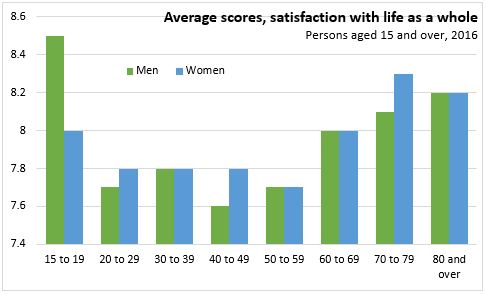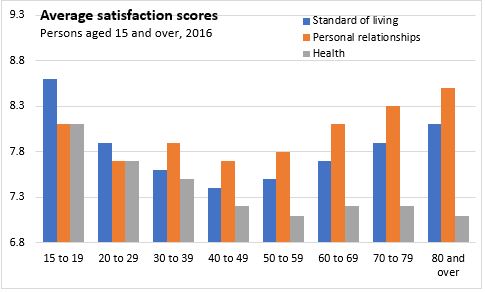The Economics and Statistics Division maintains archives of previous publications for accountability purposes, but makes no updates to keep these documents current with the latest data revisions from Statistics Canada. As a result, information in older documents may not be accurate. Please exercise caution when referring to older documents. For the latest information and historical data, please contact the individual listed to the right.
<--- Return to Archive
For additional information relating to this article, please contact:
August 02, 2018STUDY: LIFE SATISFACTION AMONG CANADIAN SENIORS, 2016 Statistics Canada has released a study using data from the 2016 General Social Survey to look at life satisfaction among Canadian seniors. Seniors represent a growing part of the Canadian population, so it is important to understand the economic and social factors which impact their quality of life.
The data show that life satisfaction is higher during the early years of adulthood (15 to 19) and among those aged 60 and over. Those aged 20 to 59 report lower life satisfaction, particularly among those aged 40 to 59. Moreover, among seniors, life satisfaction tended to increase with age, with women generally reporting higher life satisfaction than men.

New questions in the GSS allow analysis of the factors that affect life satisfaction, as those factors may differ for seniors (those aged 65 and over) and younger people. These questions asked about respondents’ health; life achievements; personal relationships; personal appearance; safety; feeling part of the community; time available to do things you like doing; and quality of local environment.
With the exception of health, satisfaction with these domains of life exhibited a U-shaped relationship with age; higher average satisfaction for those who were younger and seniors compared to those aged 20 to 59. The results show that satisfaction with health tended to decline with age.

On average, seniors reported being highly satisfied with their safety (8.4 out of 10), the quality of their local environment (8.3), and their personal relationships (8.3), while they were least satisfied with their own health (7.2). The data show that life satisfaction for those 65 and over was highly correlated with life achievements, standard of living, health, personally relationships, community, and time, while life satisfaction was least correlated with quality of the local environment.
Using a statistical model to control for other characteristics, the study shows that life satisfaction was lower among seniors who were younger, male, as well as those who were separated, divorced or widowed. Life satisfaction was higher among immigrant seniors and those residing in the Atlantic provinces. There was a significant association between self-rated health status and life satisfaction, with those who rated their general health and “excellent” having life satisfaction scores around 2 points higher than those who rated their health as “poor”.
Family income (adjusted for household size) was not significantly associated with life satisfaction among seniors. This result contrasts with existing studies which show a positive association with life satisfaction and family income for those aged 15 and over. The study notes that it is possible that family savings or wealth matter more than family income as later-life consumption is mostly financed out of accumulated savings. Results report a positive association between life satisfaction and income self-sufficiency.
The 2016 GSS also included new questions on resilience, which include questions about coping with difficulties, overcoming challenges and looking forward to the future. Controlling for other factors, the study showed there is a positive association between life satisfaction and being resilient. The study concludes that non-monetary factors may matter more for seniors’ life satisfaction than other factors, including family income.
Daily release | Full article
This article is part of the publication Insights on Canadian Society (Catalogue number 75-006-X).
<--- Return to Archive